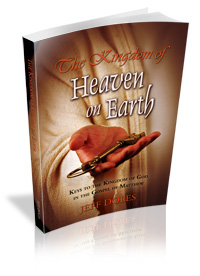Then the sons are free. (Matthew 17:26)
When Jesus and His disciples arrived back at Capernaum, men who were in charge of collecting the double-drachma temple tax came to Peter and asked, “Does your Teacher pay the double-drachma?” (Matthew 17:24). Peter said, “Yes.” When he went into the house, Jesus anticipated what he was going to say and stopped him short, “What do you think, Simon? From whom do the kings of the earth take customs or taxes, from their sons or from strangers?” (v. 25).
“From strangers,” Peter answered.
Jesus agreed, concluding, “Then the sons are free.”
In this little exchange is an amazing teaching about the kingdom of God. The sons of the kings of the earth are exempt from paying taxes, though strangers may still be required to do so. Likewise, the sons of the kingdom of God are not obligated to the Temple. Before the kingdom of God arrived on the scene, the Temple had a specific function as the place of sacrifice and the manifestation of God’s presence on earth. Now that the kingdom was at hand, in the person of the King, that function was fulfilled and the sons of the kingdom were not bound by it.
Jesus was not against the Temple, but it had served its purpose. Jesus came as the ultimate sacrifice for our sins. The Temple had been a type and a shadow, but now that the fulfillment was at hand, the shadow no longer served. The author of Hebrews draws the contrast between the earthly Temple and the Tabernacle not made with hands:
We have such a High Priest, who is seated at the right hand of the throne of the Majesty in the heavens, a Minister of the sanctuary and of the true tabernacle which the Lord erected, and not man. (Hebrews 8:10-2)Also implied in Jesus’ statement is that those who were obligated to the Temple were not sons of the kingdom, but strangers to it. This would refer to the religious leaders and teachers who rejected Jesus — they would have no place in His kingdom. In Matthew 21, after clearing the Temple courts of the moneychangers, Jesus came back into the Temple and confronted the chief priests and elders on the nature of true repentance and their rejection of God’s Messiah. He concluded, “Therefore, I say to you, the kingdom of God will be taken from you and given to a nation bearing the fruits of it” (Matthew 21:43). Though they were servants of the Temple, because of their unbelief they were not sons, but strangers to the kingdom of God, and to the Temple which foreshadowed it.
Christ came as High Priest of the good things to come, with the greater and more perfect tabernacle not made with hands, that is, not of this creation. Not with the blood of goats and calves, but with His own blood He entered the Most Holy Place once for all, having obtained eternal redemption. (Hebrews 9:11-12)
In Matthew 24, Jesus predicts the demise of the Temple and the destruction of Jerusalem within a generation (fulfilled in AD 70). But in the meantime, although He and Peter were not required to pay the double-drachma, they would do so anyway, so that know one would think He despised the Temple itself:
Nevertheless, lest we offend them, go to the sea, cast in a hook, and take the fish that comes up first. And when you have opened its mouth, you will find a piece of money; that that and give it to them for Me and you. (Matthew 17:27)The Greek for “piece of money” is stater, a coin which was equal to two double-drachmas, precisely enough to pay for Him and Peter, because Jesus the Son of God and Peter was a son of the kingdom.
In the kingdom of Heaven on Earth, the sons are not bound by types and shadows, or religious systems. We are free to follow the King alone and live fully under His provision.

The Kingdom of Heaven on Earth
Keys to the Kingdom of God
in the Gospel of Matthew
by Jeff Doles
Preview with Amazon’s “Look Inside.”
Available in paperback and Kindle (Amazon), epub (Google and iTunes) and PDF.

No comments:
Post a Comment